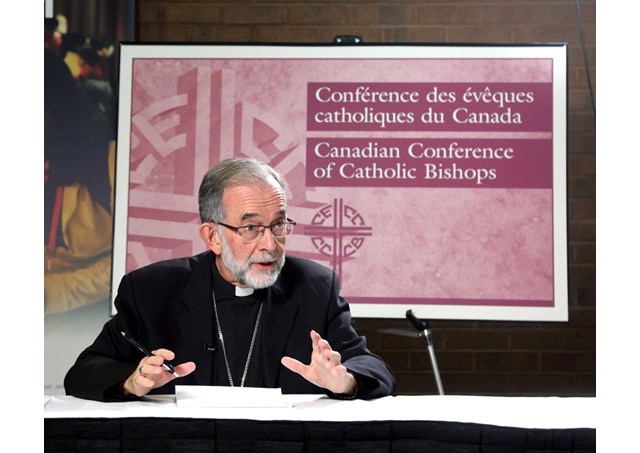
New CCCB President outlines vision for future

(Vatican Radio) Bishop Lionel Gendron of Saint-Jean-Longueuil was elected President of the Canadian Conference of Catholic Bishops (CCCB) at the end of September.
Bishop Gendron, who will serve a two-year term, has been vice president of the CCCB since 2015.
He spoke to Linda Bordoni about the main points discussed during the plenary during which he was elected and about his vision for the Church in Canada in the years to come:
Bishop Gendron says one of the highlights of the recent plenary assembly during which he was elected President was “a very special celebration in the Basilica Cathedral of Ottawa” celebrating the 150th Anniversary of the Confederation in Canada.
“All the bishops were gathered there and we had a special consecration to the Immaculate Heart of the Blessed Virgin Mary, a very moving experience” in the presence of many Canadians he said.
Gendron said it was a way to consecrate the whole country to the Blessed Virgin as the bishops committed to do just as the Virgin did “in accomplishing the will of God”
Amoris Laetitia
Another important theme of the plenary was played out when Cardinal Marc Ouellet, Prefect of the Congregation for Bishops came to speak to the Canadian bishops about the Apostolic Exhortation “Amoris Laetitia”.
He explained that Ouellet first held a conference open to journalists and then met privately with the bishops, where he focused mainly on Chapter 8 “and we had a very good sharing among us”.
“I would say the Cardinal told us very clearly that there is no theological problem with the encyclical but what is new is the pastoral approach which is described in Chapter 8: accompany, discern and integrate the frailties of the people” he said.
And he said that the bishops of Canada are in need of pastoral conversion and of institutional conversion as they adapt to this new pastoral approach which, he added, requires time and dedication: “We must find a new balance” he said.
Canada's Truth and Reconciliation Commission and its requests
Another important theme at the plenary, Bishop Gendron explained, are the issues pertaining to the request for an apology by Canada’s ‘Truth and Reconciliation Commission’ (TRC) regarding the First Nations and the question of the residential schools, most of which were run by the Catholic, Anglican and United Churches.
Gendron explained that the TRC is asking different things from different Churches and the Catholic Church has been responding.
“One of the requests of the TRC is the visit of the Pope to Canada (within the year) to ask forgiveness for what has been done in the residential schools” Gendron explained, pointing out that this is not easy because in Canada one is liable to be sued for something like this.
So, he said “right now – the spirit is always working in the Church – there is a new shift, a new vision: instead of being there to respond to the TRC, and instead of answering the government that is insisting on that point, our mission is not to answer the TRC or the government, but to answer according to the Gospel”.
Gospel provides the guiding light
“What does the gospel say? What is the spirit of the Gospel” Through the suffering of the First Nations in Canada – what do we have to do according to the Gospel and to the ministry that has been given to us as pastors of the Canadian Church?” he said.
Bishop Gendron goes on to explain in detail what exactly the TRC is and what its aims are recalling that in Canada, in the late 1880s, the government decided that the First Nations (the country’s indigenous peoples) should become true Canadians and in order to do that they were to change their indigenous culture. Thus, it decided to take children from their families and put them into residential schools where they were not allowed to speak their language, they had no relationship with their families and so on. He says there were also all kinds of abuses that took place in some of these schools. So, about 5 years ago the Commission was installed; it has been listening to people throughout Canada who were affected by these schools, and – he said - “we became aware that there has been deep suffering”
Gendron notes that the government asked the different Churches (The United Church, the Catholic Church and the Anglican Church to open these schools and so many dioceses and religious communities were involved.
“For that reason the Commission is asking these groups to express apologies – not only financially but also in words – and that’s why they asked for the Pope to come and apologize for what has been done to the First Nations” he said.
Gendron says the Church has already given a lot of money and has expressed many apologies, but says time is necessary to ask for the evaluation of the risk of being sued should the Pope decide to come.
Gendron explains that Pope Francis has been invited by the Commission and that the Canadian bishops have spoken to him about the difficulties involved: “he has encouraged us to keep on doing what we are doing and said that if at a point it is possible, he might come.”
He said the issues has also been discussed with Cardinal Parolin, with Archbishop Gallagher and other Vatican officials, “we are very open about what we lived and now we say that our point of view comes from the requirements not of the TRC, but from the requirements of the Gospel which – according to me – is more radical (than the laws of the government)”.
| All the contents on this site are copyrighted ©. |


